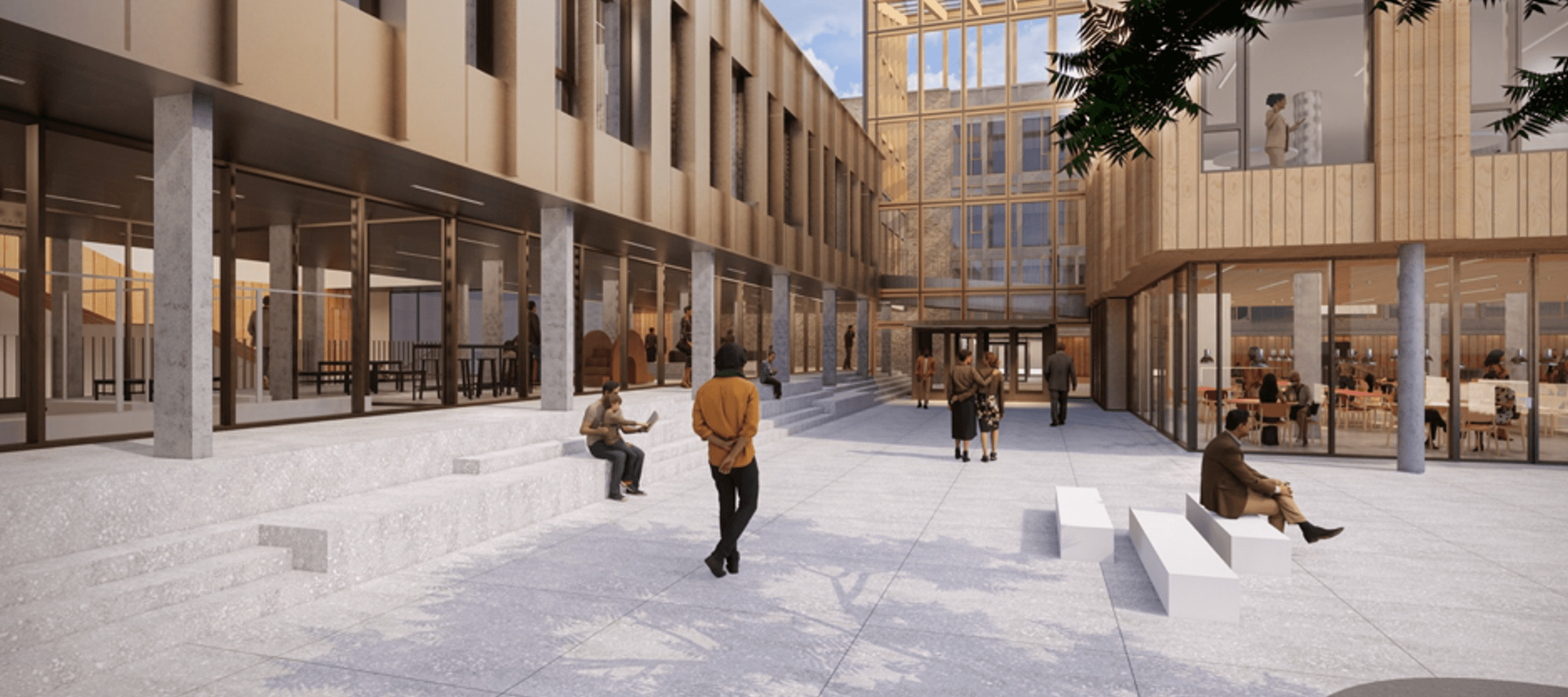Bergen Inclusion Centre
Piloting the Dignity by Design framework to build an Inclusion Centre for newly arrived migrants and refugees.

IHRB’s Dignity by Design Framework was used by the Municipality of Bergen to deliver an Inclusion Centre for newly arrived migrants and refugees, as part of its wider commitment to being a “human rights city.”
Embedding the framework from the outset informed key decisions which maximised social and environmental outcomes, such as transforming an existing teacher-training centre rather than building a new facility, and co-locating the various services which may be needed by newly arrived migrants and refugees, providing a one-stop shop that is easily accessible.
The framework’s focus on meaningful participation resulted in future users of the centre playing a key role in its design, with the canteen, restrooms, public and prayer spaces taking into account their diverse cultural backgrounds, needs and lived experiences.
Other key design decisions included the creation of an activity square to enable interactions with the wider community, and a choice of materials which focused on re-use, minimising the length of supply chains to ensure transparency and accountability, simultaneously reducing the carbon footprint
This project has led the Municipality to change its procurement practices, with wider ripple effects on future construction projects across the city.
The project manager, Celine Blanc, reflected that:
“The framework has given us new perspectives on how social and environmental sustainability go together, and how important it is that all actors and decision makers in a project collaborate if we are to achieve our goals, both at local and at a global level.
One of the construction companies involved in the project commented “The project has helped to move forward in innovation, changing our operations from just tearing down and throwing out to dismantling and using again, from being a demolition contractor to a reuse contractor. This project has definitely been an accelerator for us.“
At the centre’s opening festival in September 2024, one of the centre’s users proudly stated “The new centre makes me feel proud, safe, like I belong.”

Inside the Bergen Inclusion Centre, Norway

Outside the Bergen Inclusion Centre, Norway
Background
- The Bergen Inclusion Centre is a conversion of a former school building into a centre that both provides a language school and other services for newly-arrived refugees and migrants, as well as facilities open to the neighbouring community.
- The built environment – the places where we live, work, and interact with others – has a defining influence over our ability to lead healthy, fulfilling lives.
- IHRB’s Dignity by Design Framework aims to manage risks to human rights and maximise social outcomes by redistributing power between the various actors involved in a project, ensuring they respond to the needs of users, communities and workers, particularly the most vulnerable.
- Real-life projects which, through the framework, positively impact both people and planet are crucial to demonstrate the art of the possible, and inspire others around the world to implement similar approaches.
Aims and outcomes
The aim was for the Bergen Inclusion Centre to serve as an international flagship project to demonstrate how a built environment project can be a key tool for an inclusive society.
Who is this research relevant to?
Learning how the Dignity by Design framework can strengthen social and environmental outcomes in a built environment project can inspire policymakers, investors, industry, civil society and any others stakeholders who are working on similar projects around the world.
Project activities
The pilot project team, led by Bergen City Architects, worked to implement the Dignity in the Built Environment Framework throughout the building project lifecycle.
- Design and Architecture Norway (DOGA) has featured the Bergen inclusion centre as a best-practice example in its “National Roadmap for Smart and Sustainable Cities and Communities”.
- An article published when the centre opened stated “The last time I visited the old teacher training college in Landås, it was a place of conflicting interests and temporariness. These conflicts of interest illustrate how difficult it is to align intentions and means. Now, the building seems to embody the opposite of conflicting interests. The inclusion centre aims to achieve most things. It's a transformation of an existing building where materials from the original structure are reused. It's designed for inclusion and attempts to achieve this through an open architectural style and by involving the neighbourhood.”
For more information, please read the status reports below
- First status report (June 2019 - March 2020)
- Second status report (April 2020 - February 2021)
- Third Status Report (March 2021 - June 2023)
More information available in the videos below
- Bergen Inclusion Centre
- Details about material reuse and sustainability (English subtitles available)
- A tour of the new centre